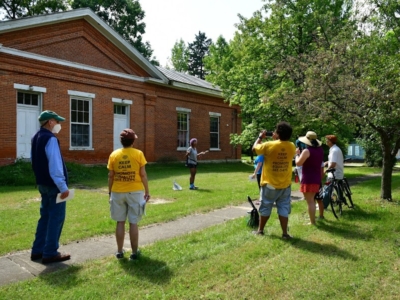McGregor eyes green degree
- Published: June 3, 2010
The Catholic nuns who taught Joe Cronin as a little boy might be pleased to know they made an impression. Those milk cartons passed out to collect pennies to feed the starving people of India? He took that seriously. In fact, you might say the question of how to feed those starving people — and beyond that, how those in developed countries can learn to live with fewer resources so that those in undeveloped countries might have access to more, and beyond that, how to raise consciousness about the need to protect diminishing global resources during a growing environmental crisis — has guided his life’s work.
Cronin, a PhD in philosophy who directs undergraduate studies at Antioch University McGregor, has spent much of his life pondering and teaching political and environmental ethics. In recent years, he’s gone a step further, developing a new Antioch University McGregor undergraduate degree in sustainability that he hopes provides students the tools they need to become leaders in a rapidly changing world of diminishing resources, climate change and environmental challenges.
“We have to not just react to a changing world, but provide avenues for people to become leaders in that world,” he said in a recent interview.
Approved in recent weeks by the McGregor Board of Trustees, the new program still needs official sanction by the Ohio Board of Regents. If the Regents sign on, Cronin hopes to have the program in place by spring 2011.
But immediately, a key course in the program, Sustainable Agriculture, will be offered this summer, taught by Megan Bachman. The course, which starts the beginning of July, examines conventional agricultural practices from a global and historical perspective, along with alternative methods that use less energy and preserve soil. Interested villagers are encouraged to take or audit the class. Registration is now open; those interested may contact the school at 769-1800.
While undergraduate degrees that focus on environmental studies have become increasingly plentiful, degrees in sustainability have not, Cronin discovered in the planning process. In fact, only one sustainability program now exists in Ohio, at Baldwin Wallace College in Cleveland. Because there’s no competition within 200 miles, a marketing study concluded that the program would attract a sufficient number of regional students for McGregor, a commuter school that offers both an undergraduate degree completion program and several masters degrees. With a new leader, Michael Fishbein, seeking to broaden the school’s program offerings, a degree in sustainability seems a good fit.
“Sustainability is a strategic direction for McGregor at this point,” Cronin said.
The sustainability program differs from those specifically aimed at environmental studies because it has an interdisciplinary focus, bringing together courses in the environment, economics and the humanities. It’s a study of how complex systems work, because those looking to solve the difficult problems of the 21st century will need to approach their task from multiple disciplines, according to Cronin. The curriculum would include social science courses on environmental economics and United States environmental policy, science classes on physical science and biological systems, and humanities classes on culture and ecology, among others.
“Sustainability is where ecological, economic and cultural practices merge,” he said.
The new program will examine not only sustainability in agriculture, including the production of local organic food and its distribution, but also sustainable practices in transportation and housing. Yellow Springs has been in the forefront of green thinking regarding building techniques, Cronin said, but villagers could go much further addressing issues of agriculture production and distribution.
Consequently, Cronin envisions, as a part of the new program, that McGregor could become a model of sustainable practices, both inside the Dayton Street building and out. For instance, he would like to launch a ride-sharing program for the school’s commuter students, who mainly come from the Dayton area, perhaps incorporating residents of the Yellow Springs community.
“It saddens me to see people come here with one person in a car,” he said. “That’s something we could do to make a difference.”
And he envisions the remaining acres of the Center for Business and Education, slated to house new businesses when completed in 2011, as an incubator for sustainable agriculture initiatives, “a place where ideas are hatched.” And he’d like to grow crops on the land near the new McGregor building.
If the school is interested in educating leaders in sustainability, he said, “You lead best by example.”
Antioch College leaders have also talked about a focus on environmental sustainability, and Cronin would like to see collaboration between the two schools, perhaps with the sustainability incubator located on the college campus.
“There are lots of places to partner with the college, and we should partner,” he said. “It would be silly for each of us to do our own thing.”
A beneficial aspect of Fishbein’s leadership is his openness to collaborative projects with the college, according to Cronin, who said former president Barbara Gellman-Danley would have resisted partnering with the college.
“I think that part of McGregor has changed for the better, being open to any form of collaboration that makes sense,” Cronin said.
However the program emerges in its final form, Cronin feels passionately that McGregor should take a leadership role in helping students address the complex needs of this century.
“There’s a growing understanding of what we’ve gotten ourselves into and where we’re headed,” he said, referring to energy use, climate change and the global awareness of diminishing resources. “But we’re not nearly far enough along.”
The Yellow Springs News encourages respectful discussion of this article.
You must login to post a comment.
Don't have a login? Register for a free YSNews.com account.












No comments yet for this article.